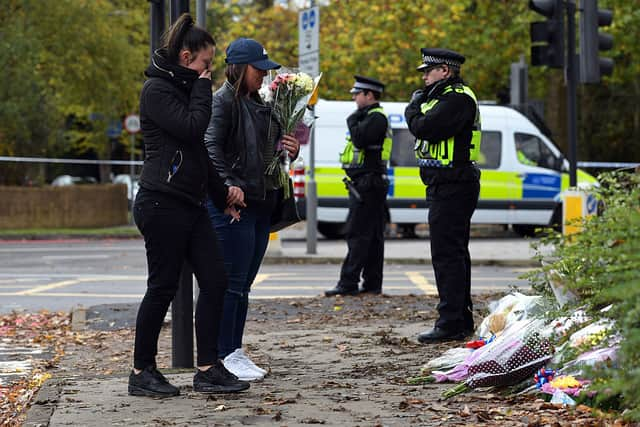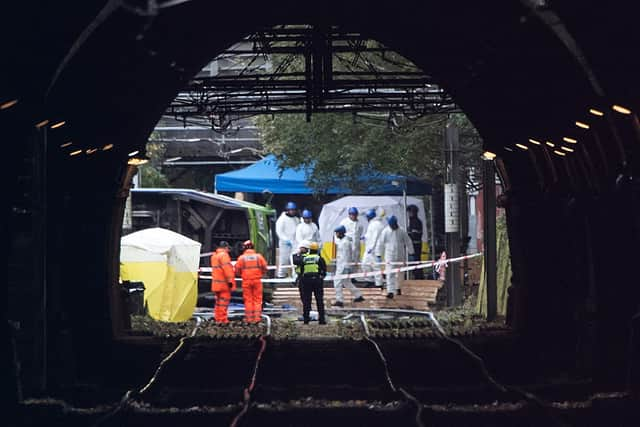Croydon tram crash: TfL fined £10M for health and safety failings over disaster which claimed seven lives
and live on Freeview channel 276
Transport for London (TfL) has been fined £10 million over health and safety failings that led up to the 2016 Croydon tram crash.
Seven passengers were killed and 21 others suffered serious injuries when the tram service running from New Addington to Wimbledon came off the tracks on a bend near the Sandilands stop on the morning of 9 November 2016. Those who died in the tragic disaster were Dane Chinnery, 19, Philip Seary, 57, Dorota Rynkiewicz, 35, Robert Huxley, 63, Philip Logan, 52, Donald Collett, 62, and Mark Smith, 35.
Advertisement
Hide AdAdvertisement
Hide AdOn the final day of sentencing at the Old Bailey in London on Thursday (27 July), Tram Operations Limited (TOL) was also fined for the disaster and will have to pay £4 million. Both travel operators previously accepted failings in their health and safety duties in the lead-up to the crash.
In June, driver Alfred Dorris was cleared of failing to take reasonable care of his passengers. While the court heard that Dorris had been driving the vehicle at three times the speed limit when it derailed, jurors were also told that a similar situation had occurred around a week earlier with another driver - and that the incident had not been adequately investigated.
Mr Dorris said he had become disoriented in the tunnel on approach to the curve – blaming a combination of external factors such as poor lighting and signage, darkness around the tunnel, and bad weather. He also apologised to the victims’ families and survivors in his first public address since the crash, remarking: “I’m a human being and sometimes as a human being things happen to you that you are not in control of.
“I’m sorry that I became disorientated. I’m sorry I was not able to do anything to stop myself from becoming disorientated. And I’m deeply sorry I was not able to do anything to reorientate myself and stop the tram from turning over. I’m deeply sorry.”
Advertisement
Hide AdAdvertisement
Hide AdProsecuting, Jonathan Ashley-Norman KC said the main failing of TfL and TOL was not making a suitable risk assessment of such a high speed derailment happening. He said there were “missed opportunities” over the years to take a closer look at the sharp bend at Sandilands, with the companies demonstrating an “over-reliance on fallible humans”.


At the first day of sentencing on Monday (24 July), Court One at the Old Bailey heard victim impact statements from those who survived the disaster. Stephen Kennedy, 31, gave a harrowing account of the moment the tram de-railed via a statement read out by Mr Ashley-Norman.
“It was like everything was moving in slow motion,” he said. “The carriage completely tipped over and I was thrown from my seat. Everything went dark. After a few moments the silence was broken by the most terrible screams.”
Mr Kennedy, who at the time had been working as an electrician on the film Murder On The Orient Express, then described how the man he had been sitting next to ended up “lying on top of [him]”. Before the crash, Mr Kennedy had heard this man talking on the phone to his wife about plans for their wedding anniversary that evening.
Advertisement
Hide AdAdvertisement
Hide Ad“I tried to free my arm but it was completely trapped. The man who I had been sitting next to prior to the crash was now lying on top of me. He was not moving and he was completely unresponsive. He had suffered a fatal head injury,” Mr Kennedy’s statement said.
“This memory stays with me to this day. I remember other passengers stepping over me to get off the tram. I remember how cold and damp it was. I’m not sure how long I lay on the tram floor. The emergency services eventually arrived.”
When he was freed by London Ambulance staff, Mr Kennedy was told he was the last survivor to be brought out of the wreckage. This is the last thing he remembers before waking up in St George’s Hospital in Tooting, where he was told doctors had been unable to save his arm and it had to be amputated.
He has since struggled with his physical and emotional recovery, and suffered feelings of guilt for having survived. “I fear my life will forever be defined by what happened on 9 November 2016,” Mr Kennedy said.


Advertisement
Hide AdAdvertisement
Hide AdThe court also heard tributes and victim impact statements from the family members of the disaster’s casualties. Stacey Smith described her brother Mark Smith as a “dependable, trustworthy, family man”, and called for those responsible for the “wholly avoidable crash” to be held to account.
Jean Smith, Mr Smith’s mother, also spoke - telling the court that no amount of money or justice would bring her son back but getting accountability may “bring some sense of peace”. She explained: “We have to live with the consequences of other people’s actions for the rest of our lives. I’m living a life sentence. It should never have happened.”
Tracy Angelo, daughter of Donald Collett, told the court how it felt to see aerial pictures of the crash site, commenting: “We know our darling, beautiful dad was in amongst that devastation and all he was doing was going to work.” She described her father as “very protective and loving”, and said his family and friends “remain completely devastated” and “will never be the same again.”
Adam, the son of Robert Huxley, said in poignant remarks: “Killed whilst travelling to work and due to retire soon – Robert and anybody else did not deserve this.” He then told of how he had “lost all trust” in the tram operators, and felt “insecurity, anxiety, vulnerability, and heartbreak” whenever he went past the network.
Advertisement
Hide AdAdvertisement
Hide AdVivian, the wife and widow of Philip Seary, added: “We need some justice for the seven lives lost and the many people injured. If I had driven my car in a reckless manner there would be consequences.”
And Philip Logan’s sister Susan Lavelle told of how in the days following the crash, she experienced another kind of torment. She was waiting for news from a hospital only to be told there had been an “unfortunate mix-up” and Mr Logan was not there. Days later, she learned confirmation of his death on the news.
Ms Lavelle said: “Phil worked hard. He would put aside his aches and pains. He was a people pleaser. He was loved for the big heart he had. I miss my bricklayer jack-of-all-trades. I will always grieve for my brother and I will always grieve for the person I once was.”
Comment Guidelines
National World encourages reader discussion on our stories. User feedback, insights and back-and-forth exchanges add a rich layer of context to reporting. Please review our Community Guidelines before commenting.
